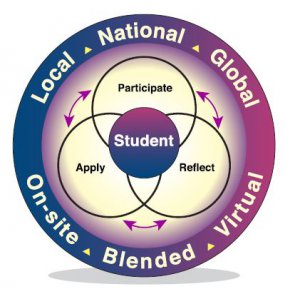
 Experiential Learning helps students develop the skills, knowledge, and habits of mind to realize their maximum potential, meet the challenges of a fast-paced and globally connected world, and be active, engaged, and compassionate citizens. It provides students with opportunities to:
Experiential Learning helps students develop the skills, knowledge, and habits of mind to realize their maximum potential, meet the challenges of a fast-paced and globally connected world, and be active, engaged, and compassionate citizens. It provides students with opportunities to:
- Participate in rich experiences connected to a community outside of school (What?)
- Reflect on those experiences to derive meaning (So What?)
- Apply their learning to influence their decisions and actions in various aspects of their lives (Now What?
Experiential Learning, early and often, provides opportunities to help students become personally successful and compassionate citizens who meet the challenges of a fast-paced and globally connected world. The experience can involve local, national, or global communities and:
- Being physically present (an on-site experience);
- Being present through the use of digital tools and technologies (a virtual experience);
- A combination of the two (a blended experience).
Key Drivers of Experiential Learning
| The Ontario Curriculum | Global Competencies |
|
|
| Education & Career/Life Planning | Well-Being |
|
|
Visit the Ontario Council for Technology Education website to learn more or see below for some different experiential learning programs available to HWDSB students.
Co-Operative Education
An experiential learning opportunity for you to get out into the workplace to apply knowledge they have learned in courses. Click here to learn more.
- Co-op is offered in every HWDSB secondary school.
- Up to two credits can be earned through co-op. These credits can be part of the compulsory credit requirements.
For more information, including current opportunities, click here to learn more.
Ontario Youth Apprenticeship Program (OYAP)
You can participate in OYAP co-op placements in apprenticeship occupations to gain experience-and potentially be signed as apprentices before finishing secondary school. Click here to learn more.
- OYAP is offered at every HWDSB secondary school through the co-op.
- OYAP is delivered at various specialized.
Dual Credit Program
Dual Credit lets you earn both a college credit and a secondary-school credit at the same time. Click here to learn more.
- Dual Credit is an experience that will help you make a successful transition to college.
- Work towards completing your OSSD while also advancing your post-secondary.
Specialist High Skills Major (SHSM)
A Specialist High Skills Major (SHSM) allows you to customize your secondary school experience in grades 11 and 12 to your career interests. SHSMs provide opportunities to earn credits matched to a specified economic sector. Click here to learn more. SHSMs available at HWDSB include:
Updated on Wednesday, July 24, 2024.

